
Craig Morgan Teicher’s We Begin in Gladness: How Poets Progress is published next week. He shares five books about starting out as a poet with Jane Ciabattari.
“I take ‘starting’ out to mean really starting out, not post-MFA at the outset of some kind of professional writing career, but at the start of one’s writing life, when writing poetry first becomes urgent and exciting and perhaps necessary,” he points out. “So these are books that were essential to me in high school, when I first started writing, and then in college, when I really dedicated myself to poetry for the long haul.”
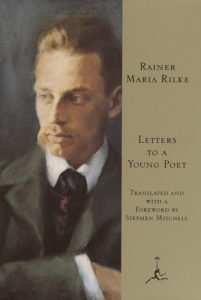
Letters to a Young Poet by Rainer Maria Rilke
My 10th grade honors English teacher, who really was one of those teachers who changed my life and is one of the two dedicatees of my new book, gave this book to me in 11th grade. It scared the shit out of me, but was my first real glimpse into the stakes for poetry.
Jane Ciabattari: What was so fierce and fearsome about Rilke upon first reading?
Craig Morgan Teicher: Rilke tells his correspondent something to the effect that unless he would die without writing, he shouldn’t bother with it. As a teenager, that’s scared me because I wasn’t sure if I would die without writing. But I really wanted to be a writer; I wasn’t sure if Rilke was saying I wasn’t cut out for it, didn’t deserve it. At the time, I thought he meant it kind of literal death, but now I think he meant a spiritual one. And I think without writing I would’ve died, at least spiritually. And, in a way, we have a choice about what kills us, and what enables us to survive. I chose poetry.
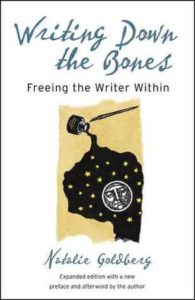
Writing Down the Bones by Natalie Goldberg
Something in me now wants to see this guide to writing and living as sort of cheesy, but I think it probably isn’t, and it, too, very concretely changed my life. Goldberg proposes treating writing like Zen practice, and committing to timed free-writing sessions every day. My high school best friend and I did these sessions separately and together for a year, and the practice played no small part in enabling my mind to improvise and trust itself on paper.
JC: Were there particular insights and prompts you still use to this day?
CMT: Goldberg’s fundamental advice is that one must keep one’s hand moving. One of the best skills writer and learn is how to write badly but keep on writing. Like a pianist practicing scales, a writer writes badly—or at least writes without too much self-censorship or criticism—in order to keep in shape, in order to be present, hand moving, when the good writing is ready to come out. I keep that in mind every time I sit down in front of the keyboard.
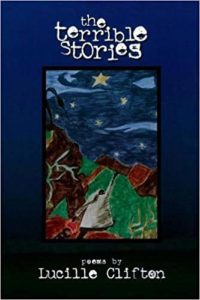
The Terrible Stories by Lucille Clifton
Clifton is one of the guiding spirits of my writing life. She was the first real live poet I ever saw give a reading, when I was in 11th grade, and it was from this book that she read. Her extraordinary presence—she communicated powerful wisdom, calm, and courage—defined for me what I thought—and still think—a poet should look and act like.
JC: Where did you hear Clifton read? Did you see her again, at other points in your life? (Did you ever meet her?)
CMT: It was at Caramoor, in Katonah, New York. This was a school trip—I was part of an amazing gradeless alternative education program in high school, and we did trips like this (I also saw Toni Morrison read the same season). I never did get to see Clifton read again, nor did I ever meet her, alas. But I kept reading her, and when the magisterial Collected Poems came out, it took a permanent place on my shelf (and on my phone—I keep the e-book handy). In fact, one of the big (and nerdy) thrills of my writing life was to see my book of poems To Keep Love Blurry be the next book after hers in BOA Editions’ New Poets Continuum series—her Collected is number 134, and mine is 135.
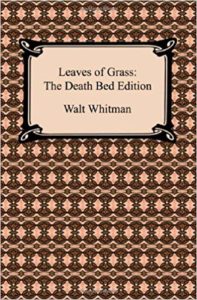
Leaves of Grass: Deathbed Edition by Walt Whitman
One of the first things one realizes about poetry is that it’s full of mysteries, things that one doesn’t quite understand. At first, one thinks the poet is leaving things out for the reader to solve. Later, one comes to realize that nothing is left out, but that one must journey through life toward the book, toward what it knows, which is not concealed, but might not be obvious. I’ve come back to Leaves of Grass again and again on my journey from bewilderment to familiarity, and the book never fails to beckon me deeper into its mysteries.
JC: What are your favorite passages in Leaves of Grass?
CMT: There are too many. I’ll just quote one that is helping me today, from “Song of Myself”:
I have heard what the talkers were talking, the talk of the beginning and the end,
But I do not talk of the beginning or the end.
There was never any more inception than there is now,
Nor any more youth or age than there is now,
And will never be any more perfection than there is now,
Nor any more heaven or hell than there is now.
These are dark times, and it can get to feeling like there is, perhaps, a bit more “hell” and a bit less “heaven” than there was just a few years ago, and like “the talkers” are talking a lot and not saying anything good. Whitman helps me put that feeling in perspective, reminds me that we have always wrestled with evil, greed, and hate. Whitman doesn’t mean we shouldn’t strive for greater perfection, greater good—he is always striving, longing, dreaming—but that we need to be awake to the world, to what it is always showing us without even trying. I love, and need, Whitman’s contradictions, his embrace of each thing and its opposite, his capacity to see all the way around.
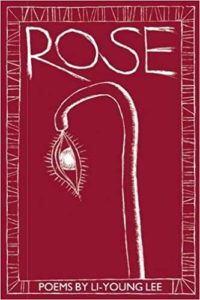
Rose by Li Young Lee
Lee is actually a poet I came to much later, in my 20s, but I wish I’d had him much sooner. His poems having a seeming simplicity and a passion that is easy to connect with, which invite a new poet in. But they’re actually fiercely wise and wild in a way that rewards bringing one’s life experience to bear on them. This is another book that endlessly beckons.
JC: Rose won the 1986 Delmore Schwartz Memorial Poetry Award. The father’s gestures and actions are both simple and profound, in poems like “Gift,” “Persimmons,” and “The Weight of Sweetness.” And, in “Dreaming of Hair,” immortal:
Out of the grave
My father’s hair
bursts. A strand
pierces my left sole, shoots
up bone, past ribs,
to the broken heart it stitches
then down,
swirling in the stomach, the groin, and
down, through the right foot.
In his introduction, Gerald Stern writes of Lee’s “moving personal search for redemption, which takes the form of understanding and coming to peace with a powerful, stubborn, remote, passionate a loving father. I think, in fact, that understanding, even accepting the father is the critical event, the critical ‘myth’ in Lee’s poetry.” Do you agree with Stern that the father is the “critical event” in Lee’s poetry?
CMT: The father was certainly the marble in Lee’s mouth at that time, the thing he always had to talk around, through, and about, in order to say anything about himself or anything else. I think most poets have a marble like this, a person or topic or memory that must be rolled around and chewed until it’s ground down and joins the very fabric of their speech, becomes an almost unconscious part of everything they write.
*
· Previous entries in this series ·
If you buy books linked on our site, Lit Hub may earn a commission from Bookshop.org, whose fees support independent bookstores.

